Comparative Analysis: IFRS Adoption in Italy and Australia
VerifiedAdded on 2022/08/24
|11
|1183
|35
Report
AI Summary
This report provides a detailed analysis of the adoption of International Financial Reporting Standards (IFRS) by Italy and Australia. It examines the implementation process, highlighting key issues such as standard interpretation and transitional challenges faced by reporting entities, including costs and cultural mismatches. The report explores the benefits of IFRS adoption, such as improved comparability and investment opportunities, while also considering the differences in implementation between the two countries. Furthermore, the report evaluates the success of IFRS adoption, offering recommendations for firms and accounting setting bodies to improve the process and address implementation challenges. The analysis incorporates positive accounting theory, focusing on management's incentives in financial reporting, and includes a comprehensive review of relevant literature to support its findings.

ACCOUNTING THEORY
AND CURRENT ISSUES
AND CURRENT ISSUES
Paraphrase This Document
Need a fresh take? Get an instant paraphrase of this document with our AI Paraphraser
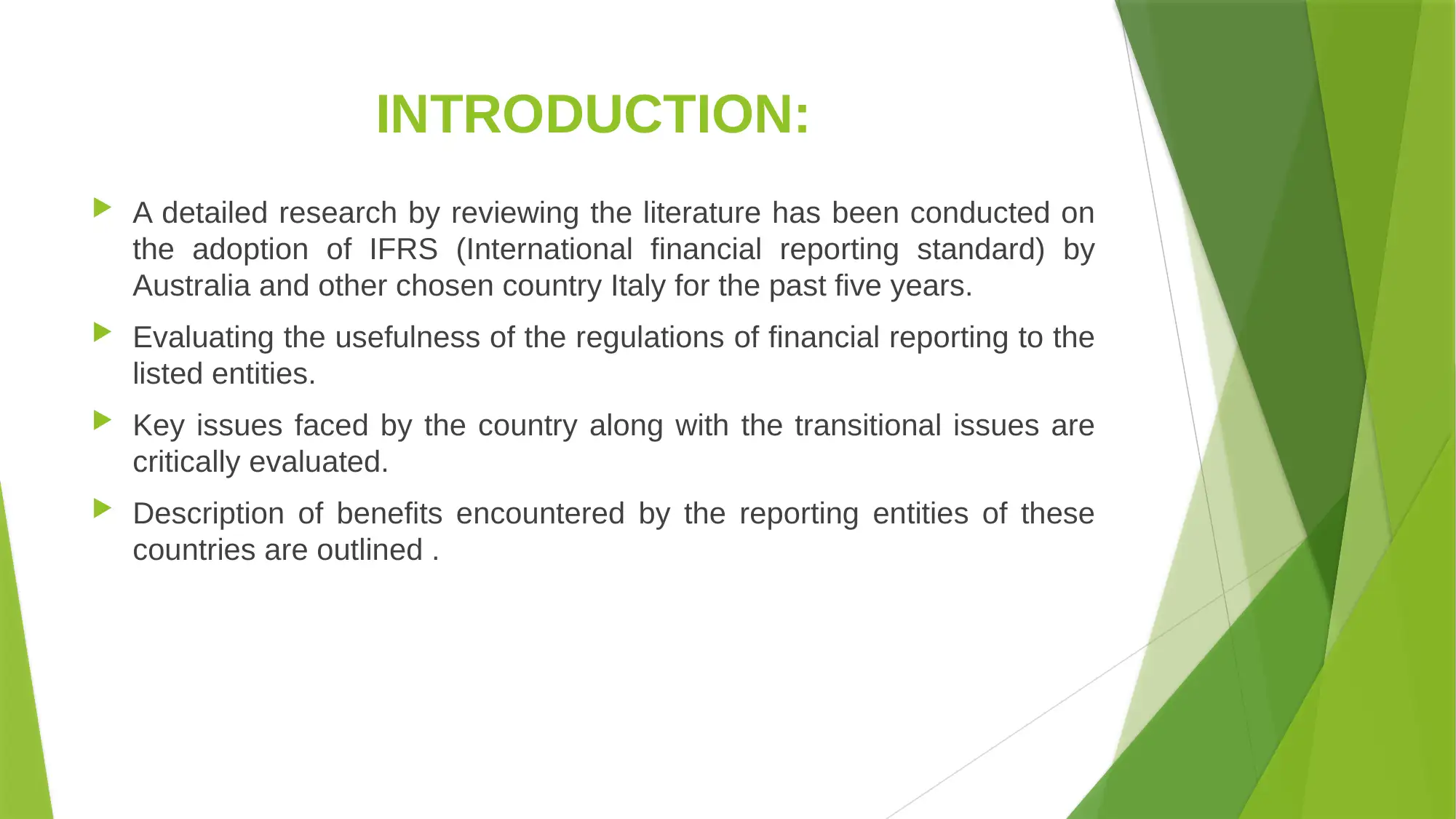
INTRODUCTION:
A detailed research by reviewing the literature has been conducted on
the adoption of IFRS (International financial reporting standard) by
Australia and other chosen country Italy for the past five years.
Evaluating the usefulness of the regulations of financial reporting to the
listed entities.
Key issues faced by the country along with the transitional issues are
critically evaluated.
Description of benefits encountered by the reporting entities of these
countries are outlined .
A detailed research by reviewing the literature has been conducted on
the adoption of IFRS (International financial reporting standard) by
Australia and other chosen country Italy for the past five years.
Evaluating the usefulness of the regulations of financial reporting to the
listed entities.
Key issues faced by the country along with the transitional issues are
critically evaluated.
Description of benefits encountered by the reporting entities of these
countries are outlined .

IMPORTANCE OF PAT IN FINANCIAL
REPORTING
It is claimed by the positive accounting theory that the aspects of actual
accounting behaviour is explained in a neutral manner and which is
value free.
The literature review on PAT is focused on the management motives to
select the financial reporting when facing agency cost and information
asymmetry.
Three hypothesis has been proposed under this theory which comprise
of Debt covenant hypothesis, Bonus scheme or plan hypothesis
and Political cost hypothesis.
Hypothesis of political cost is the disclosure that is most widely used by
the entities (Briamonte et al. 2017).
REPORTING
It is claimed by the positive accounting theory that the aspects of actual
accounting behaviour is explained in a neutral manner and which is
value free.
The literature review on PAT is focused on the management motives to
select the financial reporting when facing agency cost and information
asymmetry.
Three hypothesis has been proposed under this theory which comprise
of Debt covenant hypothesis, Bonus scheme or plan hypothesis
and Political cost hypothesis.
Hypothesis of political cost is the disclosure that is most widely used by
the entities (Briamonte et al. 2017).
⊘ This is a preview!⊘
Do you want full access?
Subscribe today to unlock all pages.

Trusted by 1+ million students worldwide
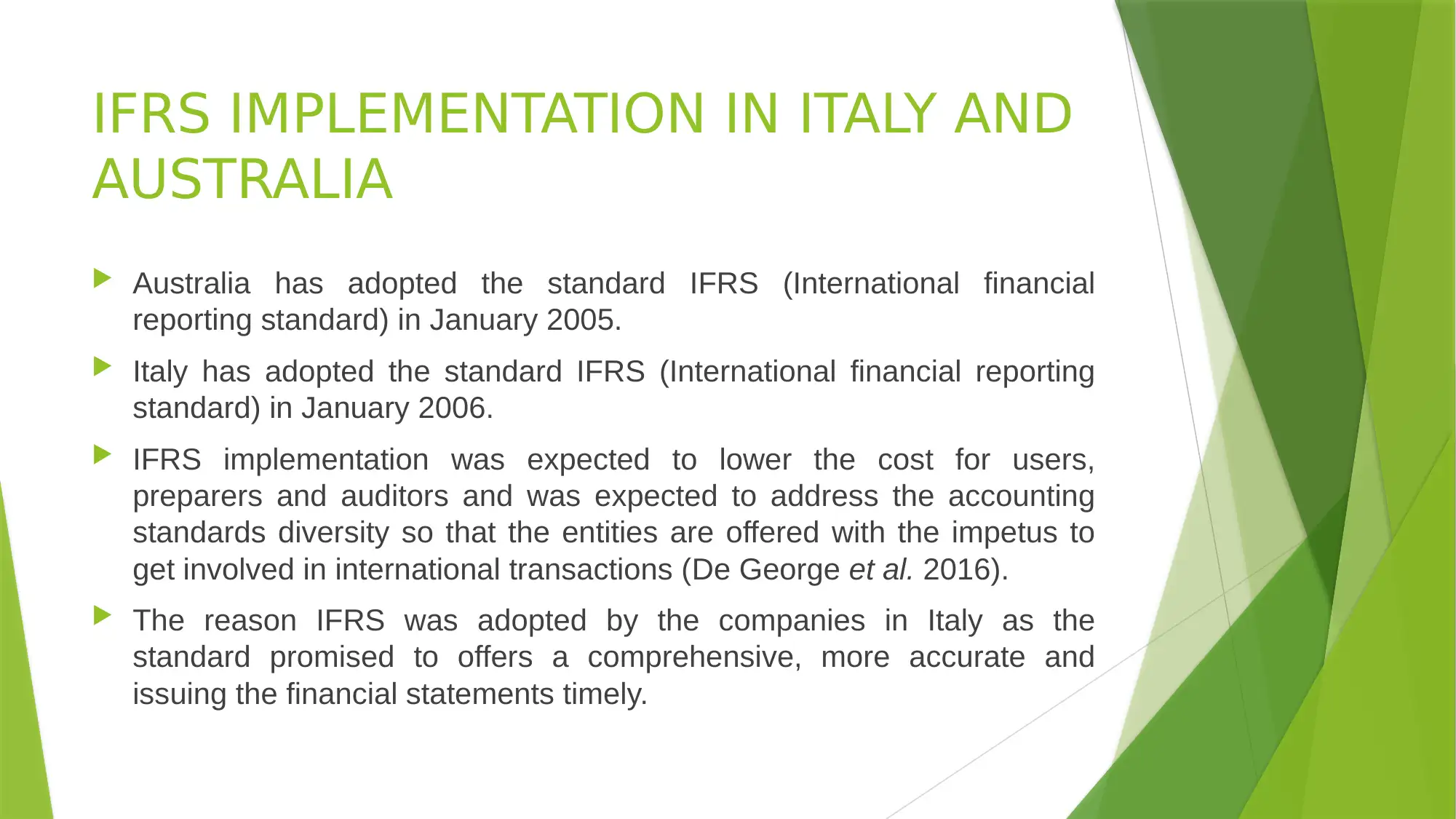
IFRS IMPLEMENTATION IN ITALY AND
AUSTRALIA
Australia has adopted the standard IFRS (International financial
reporting standard) in January 2005.
Italy has adopted the standard IFRS (International financial reporting
standard) in January 2006.
IFRS implementation was expected to lower the cost for users,
preparers and auditors and was expected to address the accounting
standards diversity so that the entities are offered with the impetus to
get involved in international transactions (De George et al. 2016).
The reason IFRS was adopted by the companies in Italy as the
standard promised to offers a comprehensive, more accurate and
issuing the financial statements timely.
AUSTRALIA
Australia has adopted the standard IFRS (International financial
reporting standard) in January 2005.
Italy has adopted the standard IFRS (International financial reporting
standard) in January 2006.
IFRS implementation was expected to lower the cost for users,
preparers and auditors and was expected to address the accounting
standards diversity so that the entities are offered with the impetus to
get involved in international transactions (De George et al. 2016).
The reason IFRS was adopted by the companies in Italy as the
standard promised to offers a comprehensive, more accurate and
issuing the financial statements timely.
Paraphrase This Document
Need a fresh take? Get an instant paraphrase of this document with our AI Paraphraser
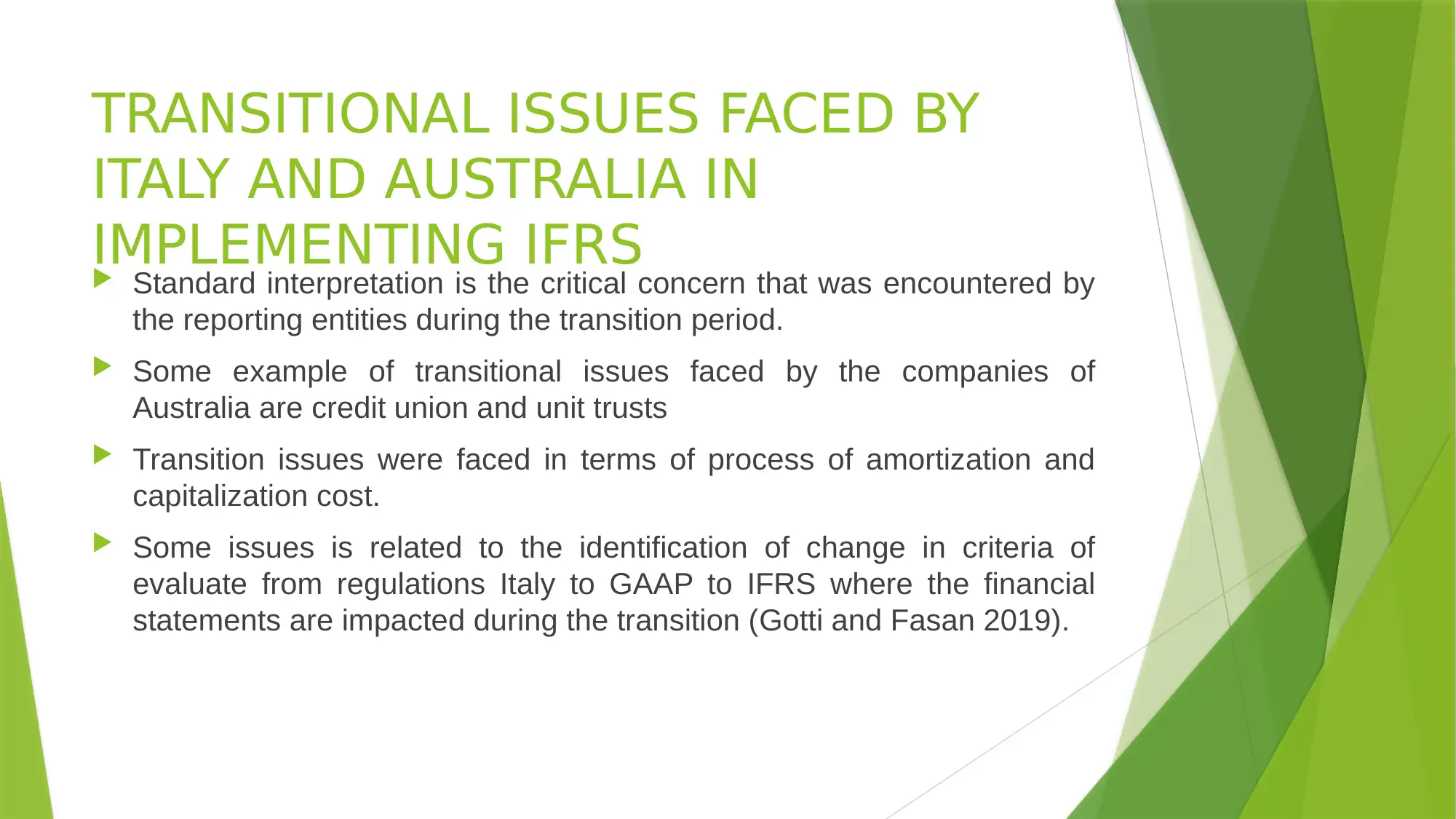
TRANSITIONAL ISSUES FACED BY
ITALY AND AUSTRALIA IN
IMPLEMENTING IFRS Standard interpretation is the critical concern that was encountered by
the reporting entities during the transition period.
Some example of transitional issues faced by the companies of
Australia are credit union and unit trusts
Transition issues were faced in terms of process of amortization and
capitalization cost.
Some issues is related to the identification of change in criteria of
evaluate from regulations Italy to GAAP to IFRS where the financial
statements are impacted during the transition (Gotti and Fasan 2019).
ITALY AND AUSTRALIA IN
IMPLEMENTING IFRS Standard interpretation is the critical concern that was encountered by
the reporting entities during the transition period.
Some example of transitional issues faced by the companies of
Australia are credit union and unit trusts
Transition issues were faced in terms of process of amortization and
capitalization cost.
Some issues is related to the identification of change in criteria of
evaluate from regulations Italy to GAAP to IFRS where the financial
statements are impacted during the transition (Gotti and Fasan 2019).
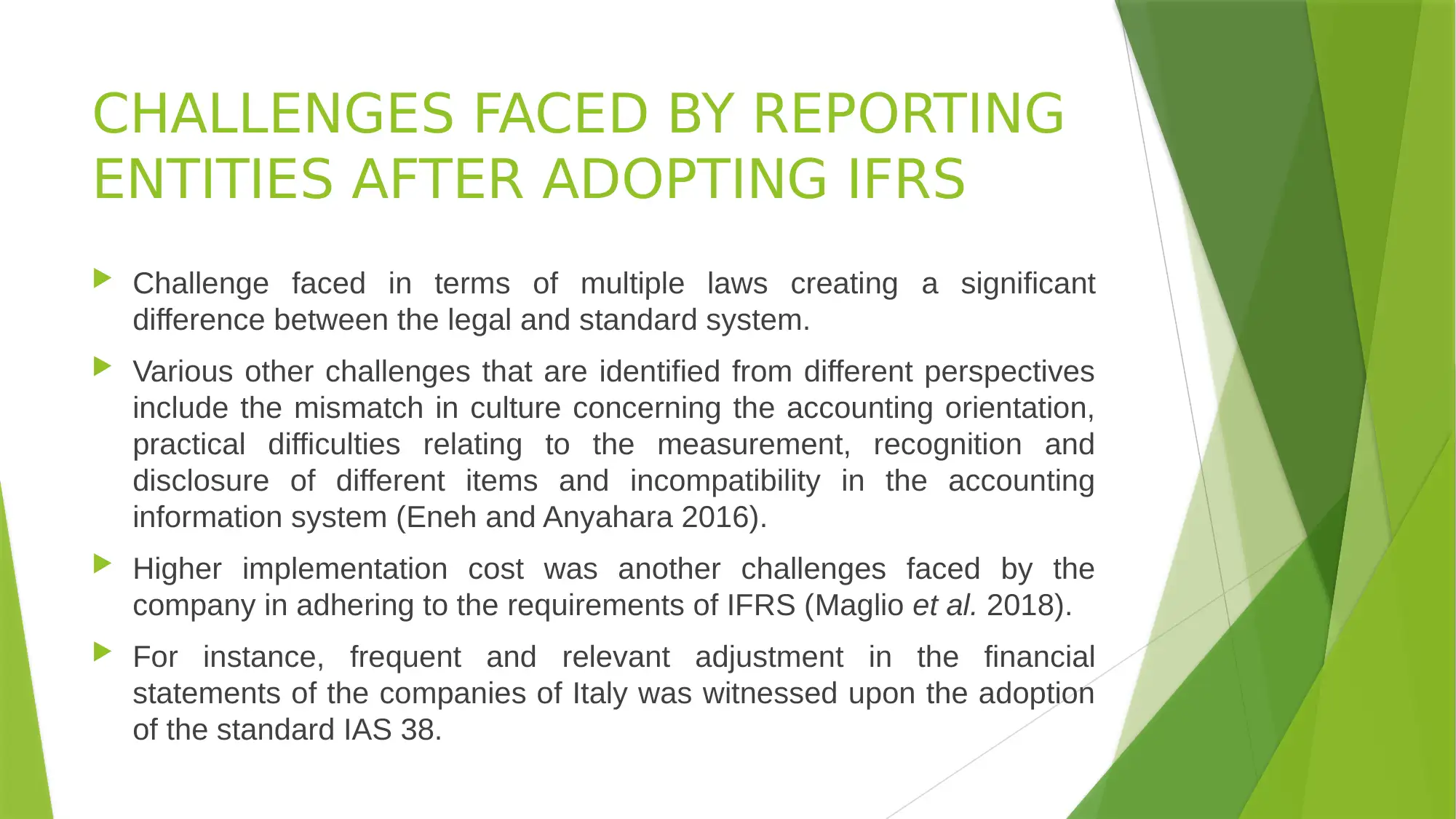
CHALLENGES FACED BY REPORTING
ENTITIES AFTER ADOPTING IFRS
Challenge faced in terms of multiple laws creating a significant
difference between the legal and standard system.
Various other challenges that are identified from different perspectives
include the mismatch in culture concerning the accounting orientation,
practical difficulties relating to the measurement, recognition and
disclosure of different items and incompatibility in the accounting
information system (Eneh and Anyahara 2016).
Higher implementation cost was another challenges faced by the
company in adhering to the requirements of IFRS (Maglio et al. 2018).
For instance, frequent and relevant adjustment in the financial
statements of the companies of Italy was witnessed upon the adoption
of the standard IAS 38.
ENTITIES AFTER ADOPTING IFRS
Challenge faced in terms of multiple laws creating a significant
difference between the legal and standard system.
Various other challenges that are identified from different perspectives
include the mismatch in culture concerning the accounting orientation,
practical difficulties relating to the measurement, recognition and
disclosure of different items and incompatibility in the accounting
information system (Eneh and Anyahara 2016).
Higher implementation cost was another challenges faced by the
company in adhering to the requirements of IFRS (Maglio et al. 2018).
For instance, frequent and relevant adjustment in the financial
statements of the companies of Italy was witnessed upon the adoption
of the standard IAS 38.
⊘ This is a preview!⊘
Do you want full access?
Subscribe today to unlock all pages.

Trusted by 1+ million students worldwide
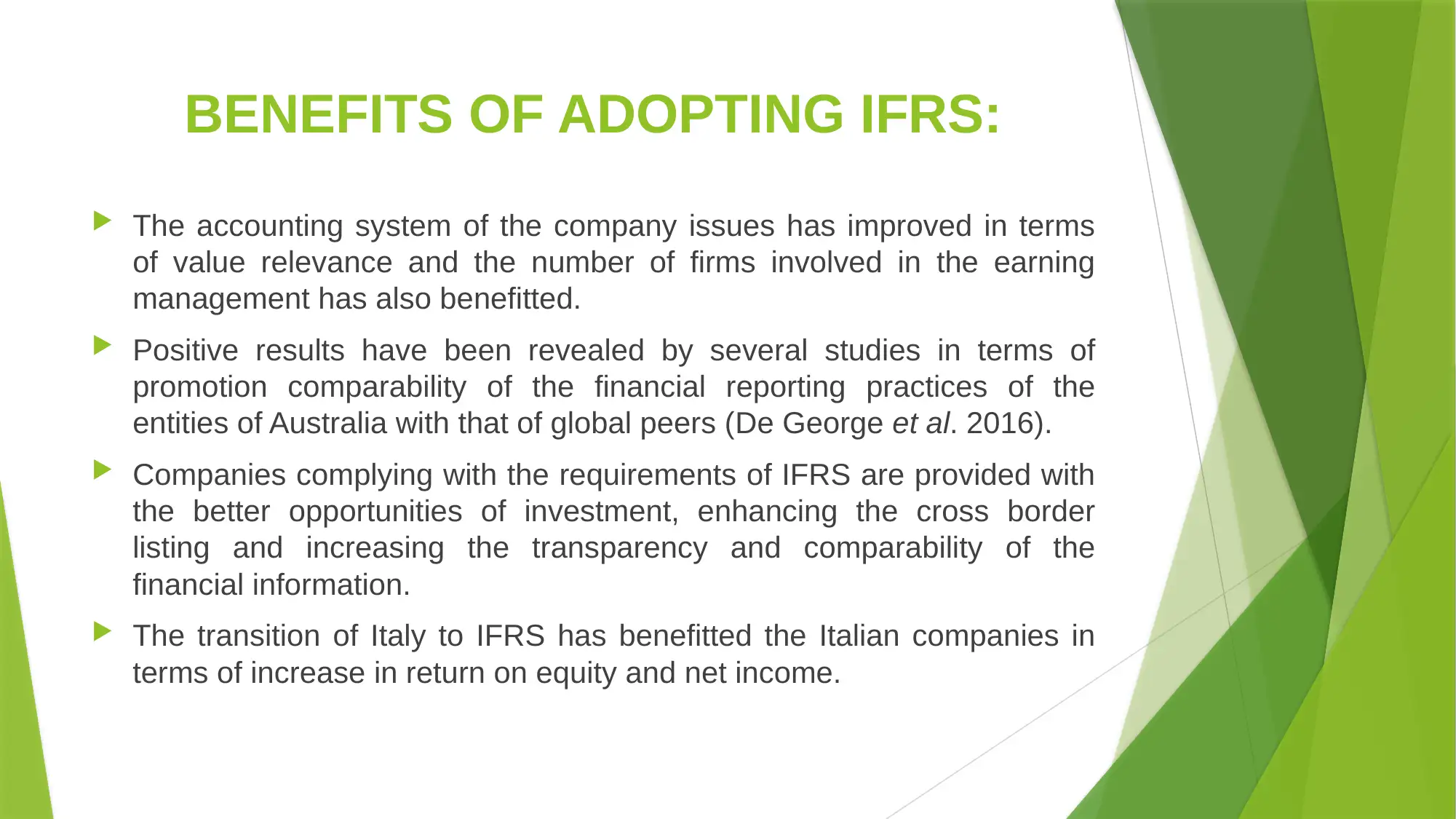
BENEFITS OF ADOPTING IFRS:
The accounting system of the company issues has improved in terms
of value relevance and the number of firms involved in the earning
management has also benefitted.
Positive results have been revealed by several studies in terms of
promotion comparability of the financial reporting practices of the
entities of Australia with that of global peers (De George et al. 2016).
Companies complying with the requirements of IFRS are provided with
the better opportunities of investment, enhancing the cross border
listing and increasing the transparency and comparability of the
financial information.
The transition of Italy to IFRS has benefitted the Italian companies in
terms of increase in return on equity and net income.
The accounting system of the company issues has improved in terms
of value relevance and the number of firms involved in the earning
management has also benefitted.
Positive results have been revealed by several studies in terms of
promotion comparability of the financial reporting practices of the
entities of Australia with that of global peers (De George et al. 2016).
Companies complying with the requirements of IFRS are provided with
the better opportunities of investment, enhancing the cross border
listing and increasing the transparency and comparability of the
financial information.
The transition of Italy to IFRS has benefitted the Italian companies in
terms of increase in return on equity and net income.
Paraphrase This Document
Need a fresh take? Get an instant paraphrase of this document with our AI Paraphraser
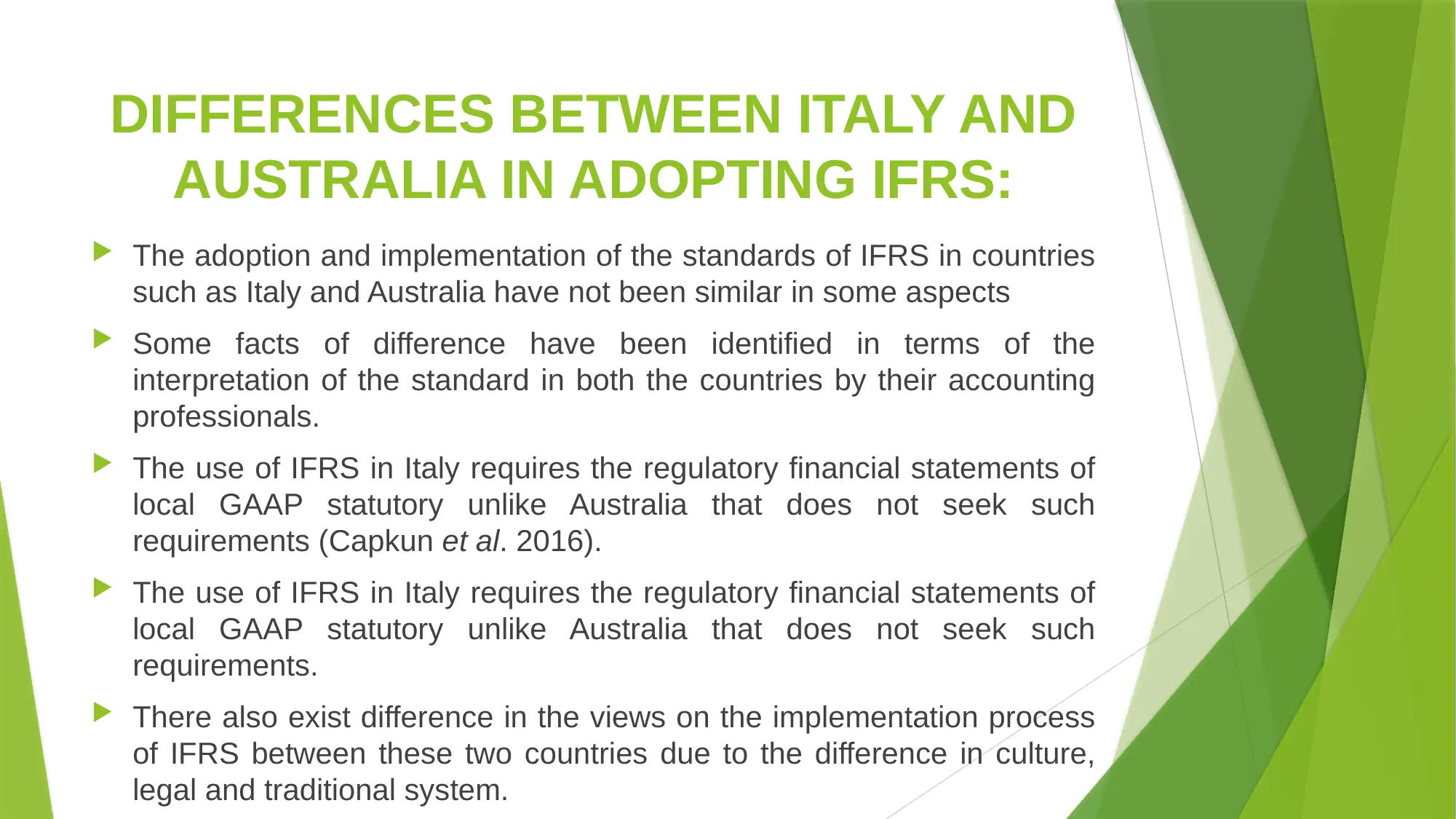
DIFFERENCES BETWEEN ITALY AND
AUSTRALIA IN ADOPTING IFRS:
The adoption and implementation of the standards of IFRS in countries
such as Italy and Australia have not been similar in some aspects
Some facts of difference have been identified in terms of the
interpretation of the standard in both the countries by their accounting
professionals.
The use of IFRS in Italy requires the regulatory financial statements of
local GAAP statutory unlike Australia that does not seek such
requirements (Capkun et al. 2016).
The use of IFRS in Italy requires the regulatory financial statements of
local GAAP statutory unlike Australia that does not seek such
requirements.
There also exist difference in the views on the implementation process
of IFRS between these two countries due to the difference in culture,
legal and traditional system.
AUSTRALIA IN ADOPTING IFRS:
The adoption and implementation of the standards of IFRS in countries
such as Italy and Australia have not been similar in some aspects
Some facts of difference have been identified in terms of the
interpretation of the standard in both the countries by their accounting
professionals.
The use of IFRS in Italy requires the regulatory financial statements of
local GAAP statutory unlike Australia that does not seek such
requirements (Capkun et al. 2016).
The use of IFRS in Italy requires the regulatory financial statements of
local GAAP statutory unlike Australia that does not seek such
requirements.
There also exist difference in the views on the implementation process
of IFRS between these two countries due to the difference in culture,
legal and traditional system.
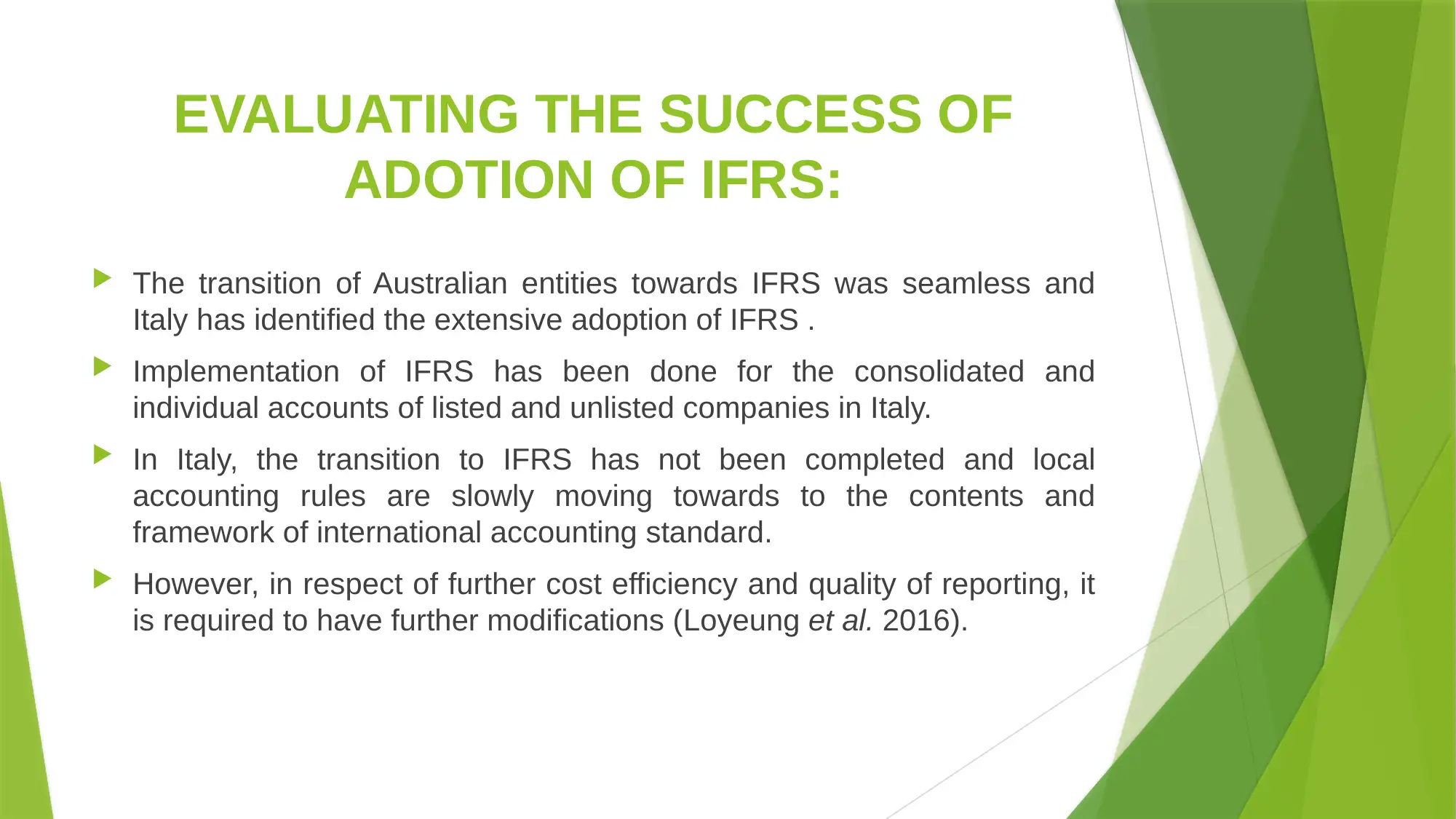
EVALUATING THE SUCCESS OF
ADOTION OF IFRS:
The transition of Australian entities towards IFRS was seamless and
Italy has identified the extensive adoption of IFRS .
Implementation of IFRS has been done for the consolidated and
individual accounts of listed and unlisted companies in Italy.
In Italy, the transition to IFRS has not been completed and local
accounting rules are slowly moving towards to the contents and
framework of international accounting standard.
However, in respect of further cost efficiency and quality of reporting, it
is required to have further modifications (Loyeung et al. 2016).
ADOTION OF IFRS:
The transition of Australian entities towards IFRS was seamless and
Italy has identified the extensive adoption of IFRS .
Implementation of IFRS has been done for the consolidated and
individual accounts of listed and unlisted companies in Italy.
In Italy, the transition to IFRS has not been completed and local
accounting rules are slowly moving towards to the contents and
framework of international accounting standard.
However, in respect of further cost efficiency and quality of reporting, it
is required to have further modifications (Loyeung et al. 2016).
⊘ This is a preview!⊘
Do you want full access?
Subscribe today to unlock all pages.

Trusted by 1+ million students worldwide
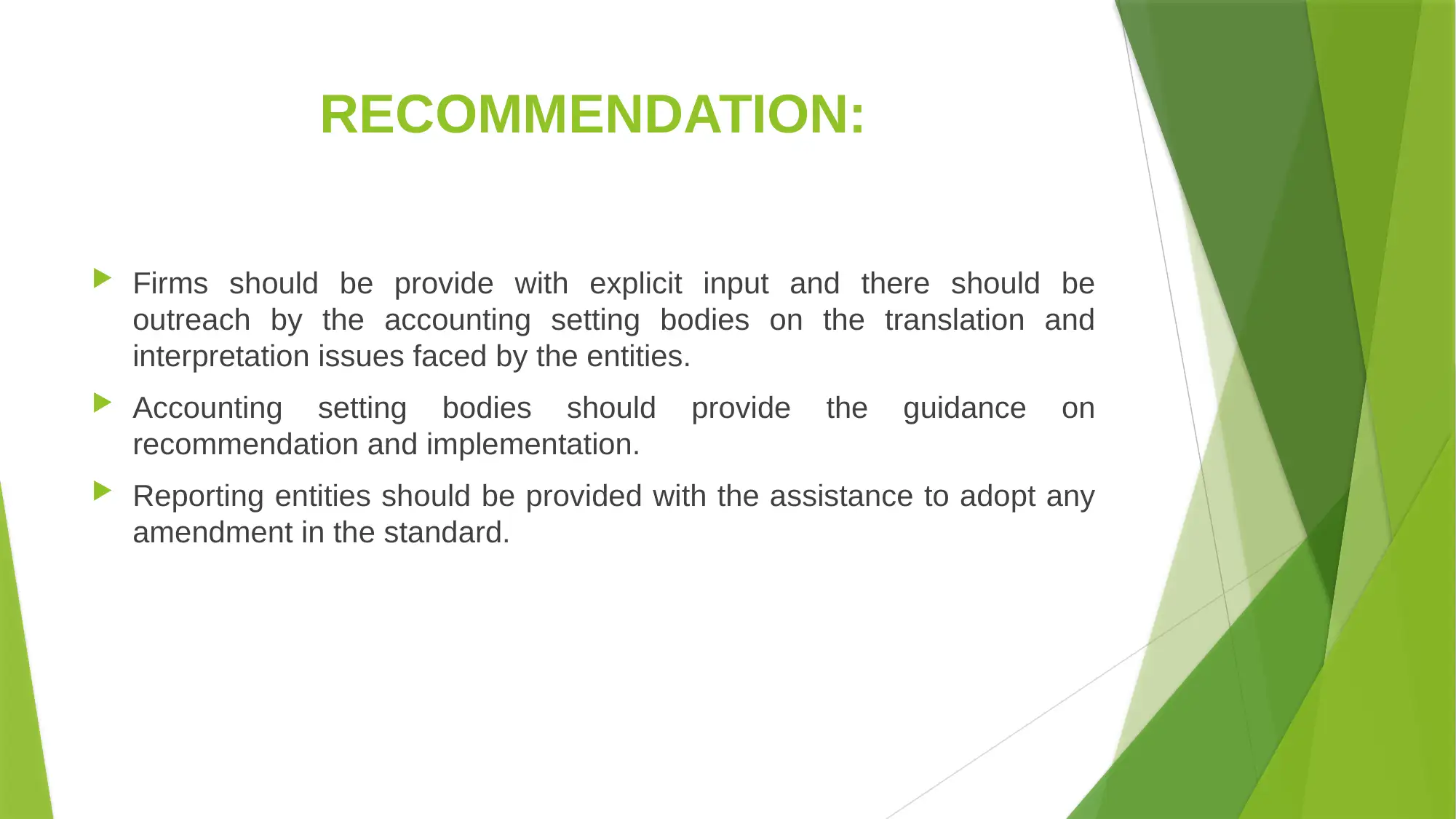
RECOMMENDATION:
Firms should be provide with explicit input and there should be
outreach by the accounting setting bodies on the translation and
interpretation issues faced by the entities.
Accounting setting bodies should provide the guidance on
recommendation and implementation.
Reporting entities should be provided with the assistance to adopt any
amendment in the standard.
Firms should be provide with explicit input and there should be
outreach by the accounting setting bodies on the translation and
interpretation issues faced by the entities.
Accounting setting bodies should provide the guidance on
recommendation and implementation.
Reporting entities should be provided with the assistance to adopt any
amendment in the standard.
Paraphrase This Document
Need a fresh take? Get an instant paraphrase of this document with our AI Paraphraser
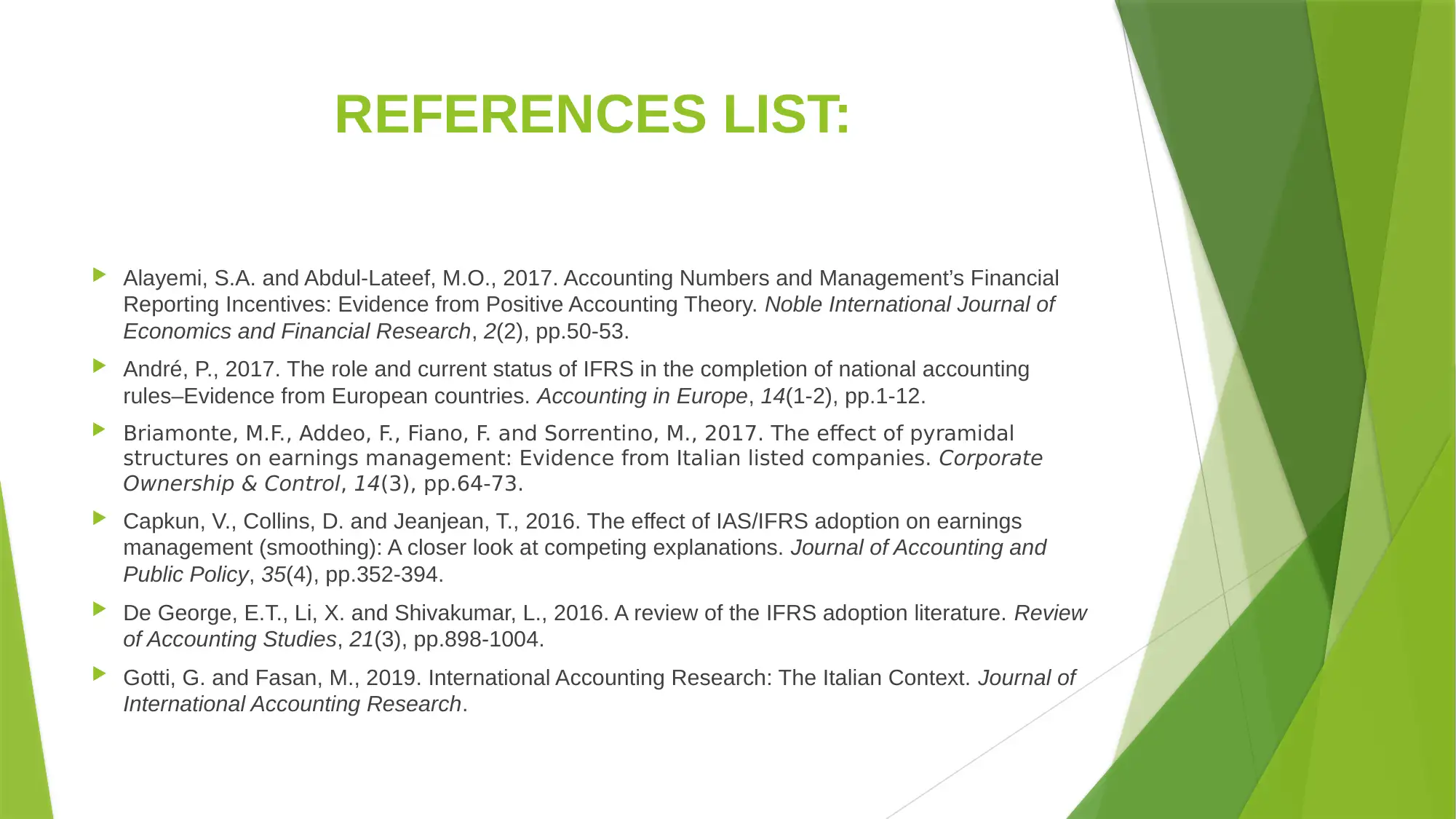
REFERENCES LIST:
Alayemi, S.A. and Abdul-Lateef, M.O., 2017. Accounting Numbers and Management’s Financial
Reporting Incentives: Evidence from Positive Accounting Theory. Noble International Journal of
Economics and Financial Research, 2(2), pp.50-53.
André, P., 2017. The role and current status of IFRS in the completion of national accounting
rules–Evidence from European countries. Accounting in Europe, 14(1-2), pp.1-12.
Briamonte, M.F., Addeo, F., Fiano, F. and Sorrentino, M., 2017. The effect of pyramidal
structures on earnings management: Evidence from Italian listed companies. Corporate
Ownership & Control, 14(3), pp.64-73.
Capkun, V., Collins, D. and Jeanjean, T., 2016. The effect of IAS/IFRS adoption on earnings
management (smoothing): A closer look at competing explanations. Journal of Accounting and
Public Policy, 35(4), pp.352-394.
De George, E.T., Li, X. and Shivakumar, L., 2016. A review of the IFRS adoption literature. Review
of Accounting Studies, 21(3), pp.898-1004.
Gotti, G. and Fasan, M., 2019. International Accounting Research: The Italian Context. Journal of
International Accounting Research.
Alayemi, S.A. and Abdul-Lateef, M.O., 2017. Accounting Numbers and Management’s Financial
Reporting Incentives: Evidence from Positive Accounting Theory. Noble International Journal of
Economics and Financial Research, 2(2), pp.50-53.
André, P., 2017. The role and current status of IFRS in the completion of national accounting
rules–Evidence from European countries. Accounting in Europe, 14(1-2), pp.1-12.
Briamonte, M.F., Addeo, F., Fiano, F. and Sorrentino, M., 2017. The effect of pyramidal
structures on earnings management: Evidence from Italian listed companies. Corporate
Ownership & Control, 14(3), pp.64-73.
Capkun, V., Collins, D. and Jeanjean, T., 2016. The effect of IAS/IFRS adoption on earnings
management (smoothing): A closer look at competing explanations. Journal of Accounting and
Public Policy, 35(4), pp.352-394.
De George, E.T., Li, X. and Shivakumar, L., 2016. A review of the IFRS adoption literature. Review
of Accounting Studies, 21(3), pp.898-1004.
Gotti, G. and Fasan, M., 2019. International Accounting Research: The Italian Context. Journal of
International Accounting Research.
1 out of 11
Related Documents
Your All-in-One AI-Powered Toolkit for Academic Success.
+13062052269
info@desklib.com
Available 24*7 on WhatsApp / Email
![[object Object]](/_next/static/media/star-bottom.7253800d.svg)
Unlock your academic potential
Copyright © 2020–2026 A2Z Services. All Rights Reserved. Developed and managed by ZUCOL.





